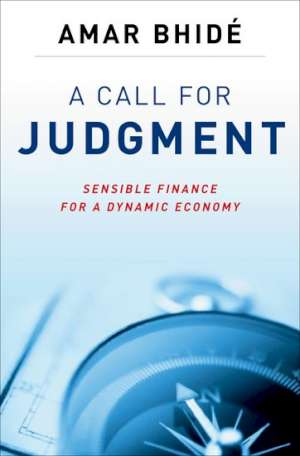17 June 2011
A Call for Judgment
Amar Bhidé
2010, Oxford University Press, 368 pages, £18.99
ISBN 9780199756070
Reviewer: Ian Harwood, Global Chief Economist, Redburn

The unparalleled ferocity of the 2008 credit crunch, and the world-wide contraction of activity and trade which resulted, has spawned an altogether new variety of ‘whodunnit’ literature. Indeed, booksellers’ shelves are now groaning under the weight of books analysing and dissecting what went wrong and who was to blame for the parlous state in which global business found itself just over two years ago.
Understandably so. The economic and financial disaster of 2008-9 had been generally unexpected. And the shock imparted by this cataclysmic event was all the greater insofar as it was preceded by the extraordinary hubris of the ‘Great Moderation’ and the unbridled optimism displayed by the financial markets.
Equally understandably, the majority of this post-mortem literature has concluded on a forward-looking note, asking what should be done to prevent a repetition of such a disaster in future years. And other books, of course, have made this ‘what should be done’ question their major concern. A Call For Judgement is very much in the latter vein.
On this reformist score, much advocacy has focused upon the need to eliminate, or at least reduce, the ‘global imbalances’ which are reckoned to have played a key role in laying the ground for the crisis; on the necessity for policy makers to identify and act to restrain speculative asset price bubbles; and on the desirability of developing a range of effective ‘early-warning’ indicators which will warn of trouble ahead.
It has, however, been the extraordinary malfunctioning of the financial system – which had been previously imagined to have had robust foundations – which has received the lion’s share of the reformist attention. The behaviour of investment bankers, central bankers, rating agencies and regulators has been widely derided, with the ‘light-touch’ regulatory regimes which previously prevailed now regarded as amazingly naive. So far, however, the steps taken to improve banks’ balance sheets, to limit excessive risk-taking and to ensure the future good behaviour and resiliency of banking systems have been pretty limited, to say the least. The bankers have played what initially looked to be an exceptionally weak hand with great skill. And the widely- expected populist backlash against the workings and dire consequences of the financial ancien regime has been conspicuous by its absence – to the puzzlement of many, including myself.
A Call For Judgement makes a significant contribution to the reformist debate, arguing that the changes propose and implanted so far – or ‘technical tweaks’, as the author so aptly describes them – are woefully inadequate to tame future excesses and thereby reduce the risk of another financial crisis in coming years and that much more substantive changes are, therefore, necessary.
In this latter regard, Bhidé takes a stand with other forthright critics of inadequate banking reform – whether Paul Volcker, Joseph Stiglitz, Simon Johnson, Mervyn King or John Kay – and makes his own controversial and indeed heavyweight contribution to the debate, taking as his starting-point the premise that: “Finance has been on the wrong trajectory for more than half a century: its defects derive from academic theories and regulatory structures whose origins date back to the 1930s”.
Much of this fairly lengthy book is devoted to an historical analysis of how the current state of play came about and a tightly-argued exposition of the current system’s faults and failings. Bhidé concludes, however, by offering several critical policy prescriptions which comprise in toto a fundamental, ‘root and branch’ re-ordering of how our financial system is organised and operates.
I greatly enjoyed this book. It covers a lot of ground and might, therefore, seem daunting. Significantly, though, I found it an increasingly compelling read and concluded that it delivers an impressive and valuable contribution to what ought to remain an absolutely central issue from the perspective of the proper functioning of the ‘plumbing’ of our economic system and, therefore, our future well-being.
